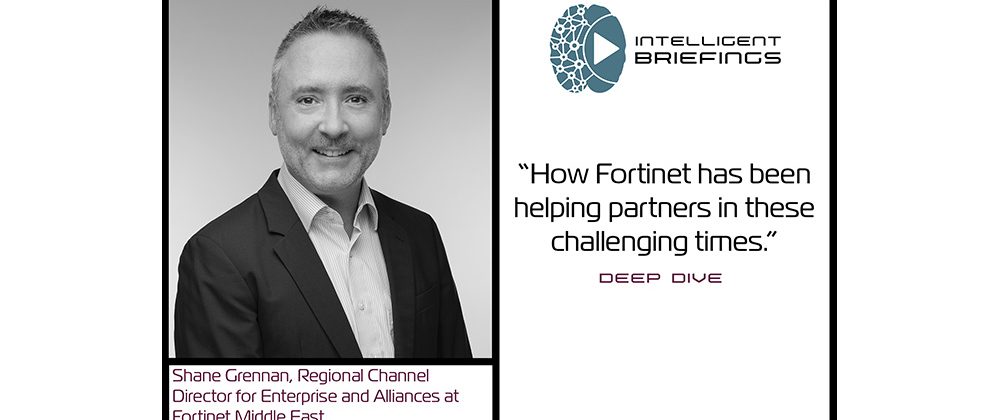Fortinet is a global leader in broad, integrated and automated cybersecurity solutions and was named Microsoft’s 2020 Commercial Marketplace Partner of the Year award for its offerings on Azure Marketplace. Shane Grennan has recently been appointed as Fortinet’s Regional Channel Director for Enterprise and Alliances in the Middle East. He tells Intelligent Tech Channels about his new role and how Fortinet has been helping partners in these challenging times. He also speaks about the trends he sees across the Middle East region and what he enjoys about working in the channel.
Could you tell me a bit more about your new role?
I’m the Regional Director for Enterprise Channel and Alliances for Fortinet in the Middle East. So, my role is two-fold. Firstly, to focus the Fortinet business in the Middle East on our enterprise channel partners and increase our partner focus on Fortinet to drive our mutual growth.
And secondly, to build strong regional business with our Global Alliance partners in areas such as public cloud and OT security. Fortinet has been very successful in the region, experiencing high growth over the years. Thankfully, our partners have benefited substantially from that. And now we want to become even closer to them as we drive for the next level of success and towards our mutually agreed goals.
How is Fortinet helping channel partners flourish in the new normal?
We have been helping in a couple of ways. Firstly, during the lockdown period our business operations continued as normal. The culture in Fortinet has always been one of personal accountability and work from anywhere. And this allowed us to transition to 100% work from home very easily. So, this allowed us to keep all our customers and partner engagements going to help our partners continue their Fortinet business.
Secondly, we were in a position, not only to advise customers but to advise partners also, on how to transition their entire workforce to home-working very quickly. Our solutions provide very high remote working connections built-in without licence. This was invaluable across the board in enacting a reaction plan to lockdown for both customers and our partners.
And thirdly, we were able to help our partners build alternatives for customers as a lot of projects stalled as people and products couldn’t move around, they couldn’t get to data centres etc. We helped a lot of partners, who haven’t embraced public cloud in a meaningful way yet, transition customer projects from on-prem to public cloud where the whole project can be done from start to finish remotely. And this is thanks to the very wide availability of Fortinet solutions and in all of the public cloud platforms, which was thankfully signalled recently by our recent award from Microsoft for Commercial Partner of the Year for Azure.
I think it remains to be seen what the new longer-term normal will look like. But Fortinet has succeeded with its partners through the initial phase. So, we’re very confident that we will continue together, whatever the future brings
Have changing customer requirements during COVID-19, such as working from home, impacted your channel strategy?
For the channel strategy, no, not really. Our top-level goal is focus – to relentlessly focus with and on our enterprise partners, on our customers, as we just talked about. Certainly the mechanism of that focus has changed and video calls, like this one, instead of face-to-face, which certainly had some bumps along the way for mass adoption, I think. But the high-level strategy and plan remains the same and that focus with our enterprise partners.
What are the nuances and regional trends you see across the Middle East, and how does that affect your approach?
Relationship is certainly important in the region, which suits my personal style. I’ve always had authentic and transparent relationships at the centre of my approach to everything, and that’s what works at Fortinet. And so, as it becomes easier to do face-to-face meetings – I’m certainly enjoying meeting all of our partners face-to-face and not just on video calls.
On the solution front, the first thing I see is faster adoption of security in the OT environment, versus adoption in some European markets, where I’ve come from. This plays to Fortinet’s position really well. We’ve been investing in OT security for over a decade – long before the current explosion of interest in demand, meaning that we’re very mature in our ability to help customers evolve in this critical area. So, this means that we’re partnering heavily across the region with OT vendors and our own partners that have expertise in that area.
The second is slower adoption of public cloud and solutions where data and management sit in the cloud, such as most EDR solutions. And again, Fortinet’s approach is particularly suited here. So, our aim is to enable the widest flexibility of hybrid cloud for our customers so they can move at their own pace and provide them fully on-prem solutions such as our EDR solutions – where they want them, and where those solutions are needed.
What are your aims and aspirations for the next 12 months in these very challenging times?
I’m looking forward. I want to engage more deeply with our partners for the very long-term. Fortinet is, and always has been, a company that wants to continue to have impact on the security industry for the betterment of our customers and for our partners. I want to see us aligned to partners that share our long-term goals and see us helping each other on that journey.
How do you see, if at all, the channel partner ecosystem changing over the next five years?
I think it is particularly difficult now, given what happened, to predict the future. I mean Digital Transformation is always driving customers forward in their strategy, it’s shaping and creating their projects. And our partners have done a very good job getting connected to that strategy, so that they can help evolve it with their customers or at least have awareness of its implications for the customers, so that they can be involved in projects early. And I see this becoming the baseline for successful partner engagement with customers going forward. Or else they’re going to be locked out of early stage value creation and they are going to be limited to reacting or being a “me too” technology provider, which is not a very good place to be.
Secondly, I think the way our customers consume enterprise applications has been changing and that’s a very long-term trend, but a long history from on-prem to public cloud and to SaaS applications, but in the same movement, they are becoming more willing to push security functions outside the organisation to MSPs. And now SASE providers, such as Fortinet.
The pace of change is increasing in cybersecurity, which is driving the shift but as it increases, l think a lot of customers will be challenged to make informed decisions that are good for their business. I see a need for our partners to embrace, at an early stage, new technologies, new trends and solutions and help their customers decide the best path for them and their business, specifically, as they go on their Digital Transformation. So, the key thing will be for partners to become part of that journey, and to feed into it, rather than just reacting to it.
We spoke about Fortinet and how it is changing the way it works, but have your partners spoken to you about how they’re changing and how their strategies are changing within the next year?
Some of those comments come from conversations with partners and some of our more forward-looking partners in the region have specific business practices that are orientated around Digital Transformation. So, to perform advisory roles to customers around what Digital Transformation can do and not necessarily just technology solutions. So, when ‘public cloud is the answer’ – pushing further into their business processes and their business to actually start to encourage them and move them faster along that process. And I guess, logically, when the customer sees the benefit of that digital change the business partner that has helped them understand that and realise it, if they also have a technology specialisation and can do the technology side of that movement, it would make perfect sense for the customers to use that enterprise partner. They’re seeing that they want to be driving alongside the customer and then complete the technology project side of things, as opposed to have somebody else help the customer evolve their business, and then a technology project falls out of that, and there’s a lot of heavy competition for it. It makes an awful lot of sense, and it pushes the partners up the value stack with customers.
What do you like about working in the channel?
Like every vendor we need our partners to achieve scale. We’re a very large company with an awful lot of customers but we can’t possibly touch them all. So that layer between the vendor and the channel partner is extremely important. And the most enjoyable thing I see is understanding what each individual partner wants to achieve, because it’s subtly different, and then helping them achieve their goals. When we get to that sort of stage where we’re working closely together, it is very rewarding.
Is there anything else you’d like to add which we haven’t touched upon?
From a personal point of view, I’m delighted to have recently moved into the Middle East. It is going to be certainly easier to meet all of our partners now lockdown is over in Dubai. I’m very much looking forward to meeting all of our partners in the region.

